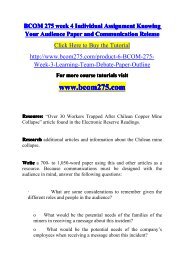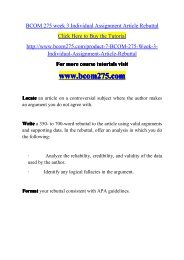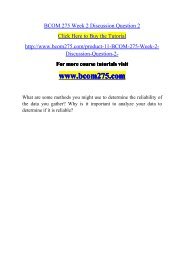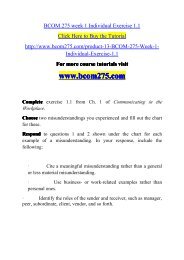BCOM 275 Final Exam Guide 4.-bcom275dotcom
For more course tutorials visit www.bcom275.com 1) The term channel in communication means A. the medium through which a message travels from sender to receiver B. the context of the communication C. the volume at which a message is received D. the process of changing thoughts into symbols 2) This preparation process involves looking at the characteristics of the receivers of the sender’s message. A. Determining the message B. Audience analysis C. Channel evaluation D. Receiver response analysis 3) A receiver’s response to a sender’s message is called A. channel B. feedback C. encoding D. decoding 4) This act is involuntary and happens automatically.
For more course tutorials visit
www.bcom275.com
1) The term channel in communication means
A. the medium through which a message travels from sender to receiver
B. the context of the communication
C. the volume at which a message is received
D. the process of changing thoughts into symbols
2) This preparation process involves looking at the characteristics of the receivers of the sender’s message.
A. Determining the message
B. Audience analysis
C. Channel evaluation
D. Receiver response analysis
3) A receiver’s response to a sender’s message is called
A. channel
B. feedback
C. encoding
D. decoding
4) This act is involuntary and happens automatically.
- No tags were found...
You also want an ePaper? Increase the reach of your titles
YUMPU automatically turns print PDFs into web optimized ePapers that Google loves.
D. informal<br />
29) Deliberately blaming individuals or groups for things they really did not do<br />
is called<br />
A. ethnocentrism<br />
B. scapegoating<br />
C. stereotyping<br />
D. discriminating<br />
30) An attempt to characterize causes of events to either personalities or<br />
external situations is called<br />
A. projection<br />
B. halo effect<br />
C. attribution error<br />
D. selective attention<br />
31) The practice of using a case that has already been decided as a guide when<br />
deciding new cases is referred to as<br />
A. legal morality<br />
B. legal paternalism<br />
C. causation principle<br />
D. appeal to precedent<br />
32) A value judgment requires this type of assessment.<br />
A. Worth or desirability<br />
B. Consistency<br />
C. Normative<br />
D. Monroe’s Value Sequence<br />
33) What is the belief that laws are justified if they prevent a person from<br />
harming him- or herself known as?<br />
A. Offense principle<br />
B. Harm principle<br />
C. Legal paternalism<br />
D. Legal moralism
















